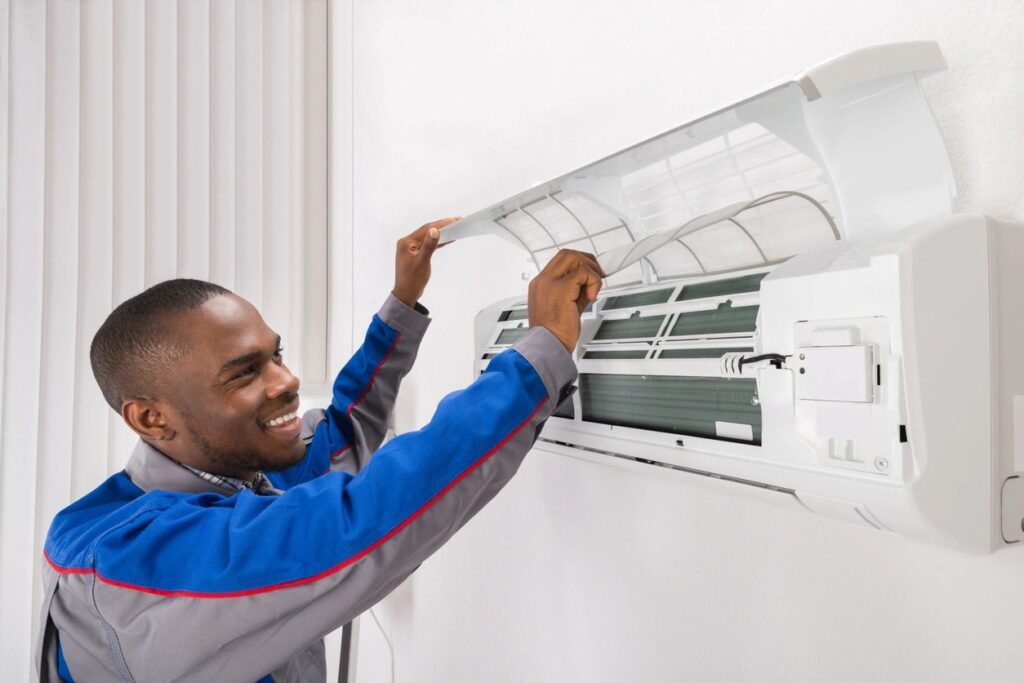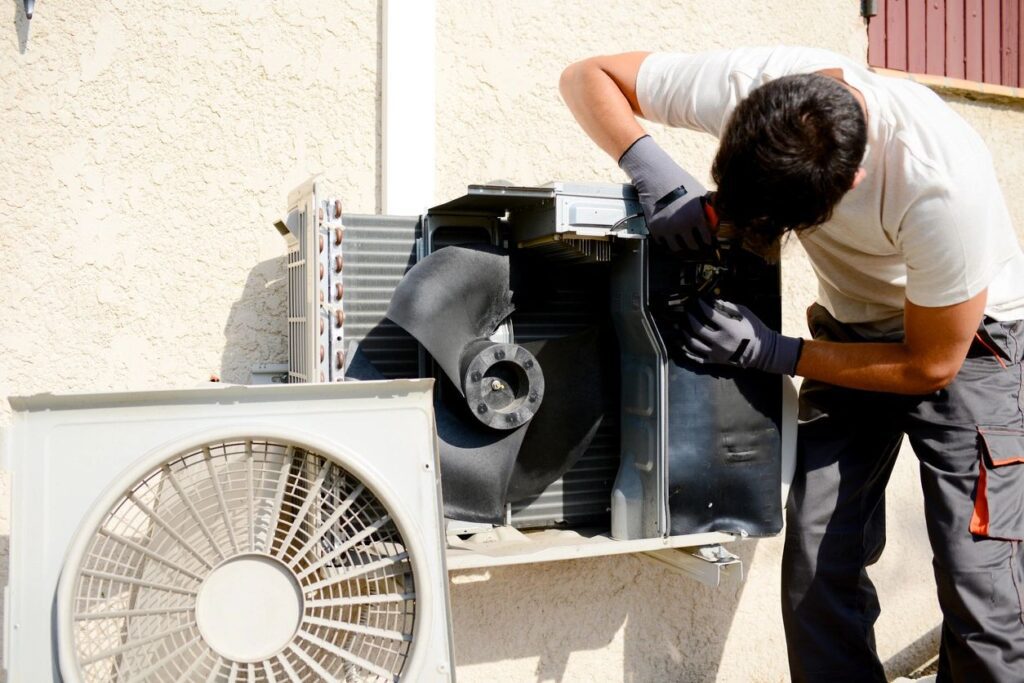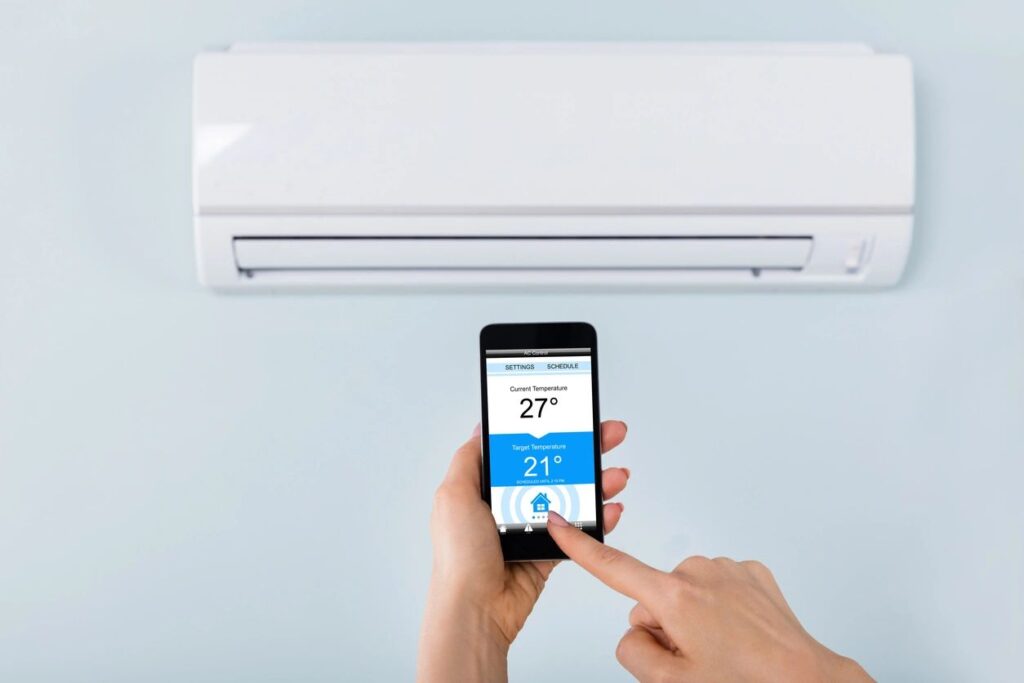Importance of Regular AC Maintenance: Why it’s Crucial
Do you admit to neglecting your air conditioning system? If so, you should rethink how you approach things. Maintaining the efficient and seamless operation of your cooling system depends on regular AC maintenance, which directly affects your comfort and pocket book. This blog post will go over the value of routine AC maintenance and the reasons every homeowner should give scheduling high attention first.
Benefits of Regular AC Maintenance
Regular AC repair has many advantages beyond only ensuring your house stays cool. It guarantees that you maximize your investment and is therefore very important for the lifetime, efficiency, and general performance of your system. Let’s explore more the particular benefits of consistent upkeep.

A. Extended Lifespan
Your AC unit’s lifespan can be much increased with regular maintenance. Consider it as routine medical visits; early identification of issues guarantees its remedy before they become major. During a normal visit, a technician might find, for instance, a fan belt worn out and replace it. This keeps the belt from breaking, thereby preventing additional damage and maybe a more costly repair result. Early resolution of such problems helps to lower the general load on the system, therefore enabling it to run for many more years without malfunction.
B. Improved Efficiency
Less running costs and better environmental friendliness characterize an effectively running AC unit. Technicians clean and change parts throughout routine maintenance to guarantee the system runs as nearly perfect as it could. For example, unclean coils can force your AC to run harder, therefore raising energy consumption. By improving heat exchange, cleaning these coils lessens system load. Furthermore, maintaining a comfortable temperature in your house without needless energy use depends on thermostat checking and calibration.
C. Lower Energy Bills
Reduced energy costs directly follow from increased efficiency brought forth by regular maintenance. The system uses less electricity to chill your house when every part of your AC is running as it should. A clean air filter, for instance, lets air pass more freely, therefore lowering the fan’s work load. Your monthly utilities will show obvious savings from this. These savings over time can be somewhat substantial, helping to cover the expense of routine maintenance.
D. Enhanced Indoor Air Quality
Regular AC repair helps to greatly enhance the quality of the air you breathe indoors. Dust, pollen, and other allergens can build up in the filters and ducts of your system and travel around your house perhaps aggravating your health. Maintenance services assist eliminate these contaminants by cleaning and replacing filters as well as occasionally even by duct cleaning. For those with allergies or respiratory problems especially, this is very crucial since it can help general health and lessen symptoms.
Risks of Neglecting AC Maintenance
Ignoring AC maintenance could cause a variety of issues beyond only inconvenience. Regular visits help to prevent minor problems from becoming significant fixes and damage the effectiveness and safety of your system. Let’s investigate the particular hazards involved in ignoring AC maintenance.
A. Higher Repair Costs
Ignoring routine maintenance could cause over time more expensive repairs. Little faults like a worn-out fan belt or a blocked drain line could go undetectable and aggravate to cause more serious problems including compressor failure. Repairing or replacing significant components is significantly more costly than handling small problems during normal maintenance. A refrigerant leak, for instance, can cause the compressor to overheat and fail, necessitating a pricey replacement.
B. Potential Breakdowns
Regular maintenance on AC units helps to prevent unplanned breakdowns, particularly in hot summer months when demand is highest. A sudden failure can leave you without cool when you most need it, which would cause great pain and maybe dangerous heat levels in your house. For example, the system may overheat and unexpectedly shut down if the condenser coils are not cleaned.
C. Health Risks
By running dirty air about your house, a neglected AC system can seriously endanger your health. Dirtful filters and ducts allow mold, mildew, bacteria, and other dangerous germs to flourish, aggravating respiratory problems and other health issues. Mold spores, for instance, can aggravate asthma symptoms and create allergic responses. Frequent maintenance guarantees that your AC system is clear of these dangerous pollutants and so promotes a better interior environment.
D. Voiding Warranties
Many AC makers demand frequent maintenance as part of their warranties. Ignoring your system as advised runs the danger of voiding your warranty, thus you could be liable for the whole cost of any repairs or replacements. For instance, the manufacturer can refuse to reimburse the repair expenses should your compressor fail and it is discovered that neglect of maintenance caused the problem. Frequent maintenance guarantees that your warranty is valid, therefore shielding you financially should a serious breakdown occur.
How Often Should You Schedule Maintenance?
Manufacturer guidelines, the particular requirements of your system, and your local environment might all affect the best timing for AC maintenance. Let’s examine the factors that will enable you to create a maintenance plan keeping your air conditioner in perfect performance.

A. Manufacturer Recommendations
Most AC manufacturers advise at least once a year, usually in the spring before the intense summer use starts, scheduling maintenance. This timing guarantees your system runs effectively when you most need it and lets experts ready it for the higher demand. Following the manufacturer’s maintenance schedule guarantees that your system runs effectively and that any possible faults are fixed before they become big concerns.
B. Factors to Consider
The age of your system, the frequency of use, and your living environment’s temperature all affect how often you should plan AC maintenance. Older units or those used extensively in hot regions, for example, would call for more regular maintenance. Moreover, residences in places with high pollen or dust could gain from more regular filter changes and cleaning. To decide the appropriate maintenance plan for your particular circumstances, you must take these elements into account and speak with an expert.
C. Importance of Professional Maintenance
Although some homeowners may handle some basic maintenance, professional maintenance is very essential for complete care. With the tools and knowledge HVAC professionals possess, they can completely check and maintain your air conditioner to guarantee that every component is operating as intended. Professional maintenance also covers chores amateurs might not be qualified for, such checking refrigerant levels and looking over electrical components. Frequent professional maintenance guarantees that every part of your system is in good condition, so preventing problems and increasing the life of your air conditioner.
What Does AC Maintenance Involve?
AC maintenance consists on a range of chores meant to keep your system running effectively and without problems. From enhancing performance to avoiding future problems, every chore is really vital for the general operation of your AC unit. Let’s break out the particular elements of a thorough AC maintenance schedule.
A. Cleaning and Replacing Filters
Changing or cleaning the filters is one of the most important components of AC upkeep. Filthy filters impede airflow, which increases system effort to cool your house and lowers efficiency. Frequent filter cleaning or replacement helps to preserve ideal airflow and keeps system dust and trash free. Although this varies depending on use and climatic conditions, filters should normally be checked regularly and replaced every three months.
B. Checking and Lubricating Moving Parts
Regular lubrication is necessary for the several moving components of AC systems—such as motors and fans—that must run properly. Technicians examine these parts for wear and tear and lubricate them to lower friction, therefore guaranteeing that the system runs quietly and effectively throughout maintenance. Effective lubrication also extends the lifetime of components, therefore preventing early wear and increasing the general dependability of your system.
C. Inspecting and Cleaning Coils
Over time, the dirt and trash accumulating in your AC unit’s evaporator and condenser coils will lessen its heat-absorbing and releasing capacity. Examining and cleaning these coils part of routine maintenance helps to keep effective heat exchange and keeps the system from overheating. The system may work harder due to dirty coils, therefore raising energy consumption and the likelihood of a breakdown. Maintaining optimal effectiveness of your AC depends on cleaning the coils.
D. Checking Refrigerant Levels
Effective running of your AC system depends on appropriate refrigerant levels. Technicians check refrigerant levels and hunt for leaks during maintenance. Low refrigerant levels can force the system to work harder, increasing energy consumption and perhaps compressor damage. Should a leak be found, the expert will fix it and replenish the refrigerant to the correct amount, therefore guaranteeing best cooling performance.
E. Ductwork Inspection
Essential component of AC maintenance is ductwork inspection. Significant energy waste and lower cooling performance might follow from leaks or damage in ducts. Technicians check the ductwork for any leaks or damage and fix required issues to guarantee equal distribution of the cooled air throughout your house. Through their prevention of dust and pollution introduction, properly sealed ducts increase system efficiency and interior air quality.
F. Electrical Components Check
Correct operation of AC systems depends on different electrical components. Technicians looking for wear or damage check the wiring, capacitors, and other electrical components during maintenance. They also guarantee that the electrical components of the system are running effectively and securely and that all connections are Early addressing of electrical problems guarantees the safe running of your AC unit and helps to prevent system breakdown.
DIY vs. Professional Maintenance
Regarding AC repair, homeowners can tackle chores requiring professional knowledge as well as ones requiring their own ability. Knowing the differences between do-it-yourself and expert maintenance will enable you to decide how best to treat your air conditioner.

A. Importance of Hiring a Professional
Although some house owners may handle maintenance chores like cleaning or filter replacement, engaging a professional for complete maintenance is highly advised. Professional technicians have the instruments and skills to do extensive inspections and handle any problems the uneducated eye would not see. By guaranteeing proper and safe maintenance, they also help to lower the danger of additional voiding warranties or damage. Professionals can also offer insightful analysis and suggestions based on their great knowledge with AC systems.
B. Tips for DIY Maintenance
Here are some pointers for people who would rather handle some maintenance chores on their own. Simple chores that help to keep your system running well are routinely inspecting and cleaning filters, maintaining the area surrounding the outdoor unit free of trash, and making sure vents and registers are not blocked. Periodically looking at the outdoor unit for obvious wear or damage will also help you find possible problems early on. It’s important to understand, nevertheless, the limits of do-it-yourself maintenance and schedule expert advice for more difficult chores. A licensed technician should, for instance, always check refrigerant levels and electrical components.
Cost-Benefit Analysis of Regular AC Maintenance
Knowing the financial results of consistent AC maintenance will enable house owners to value it more. A careful cost-benefit study shows that the long-term savings and advantages much exceed the initial maintenance service cost.
A. Comparing Costs of Maintenance vs. Repairs
Regular maintenance clearly pays off when one compares the expenses of it to possible repair costs. Regular maintenance helps avoid serious problems needing costly replacements or repairs. For instance, depending on the intricacy of the service and your location, a normal maintenance visit can cost anywhere from $75 to $200. Repairing a significant item like a compressor, on the other hand, can run anywhere from $1,500. Investing in regular maintenance helps you to prevent the more expensive expenses related to system breakdowns and emergency repairs.
B. Long-Term Savings from Regular Maintenance
Regular AC maintenance lowers the possibility of expensive repairs and increases energy efficiency, so saving long-term costs. A well-kept system reduces the energy required to chill your house, so saving electricity costs. Moreover, by fixing little problems before they become more serious, you can increase the lifetime of your apartment and postpone the necessity for an expensive replacement. A system that gets regular maintenance, for example, can survive 15 to 20 years; a neglected system might only live 10 to 12 years.
C. Potential ROI on Energy Bills
Regular AC repair clearly shows the return on investment (ROI) in the lower energy use. A kept-up system runs more effectively, uses less energy, and reduces your monthly utility bills. It is a wise financial move since over time the savings on energy bills more than cover the cost of maintenance services. For instance, depending on your energy consumption and rates, if regular maintenance lowers your energy cost by 10%, the annual savings can equal several hundred dollars.
Conclusion
Proper operation and lifetime of your air conditioning system depend on regular AC maintenance. Long-term cost savings are only one benefit; it also guarantees your comfort and health. Therefore, schedule maintenance not waiting for your AC to fail; instead, include it into your annual schedule and get the advantages. See a qualified expert right now to keep your AC running for years to come.
